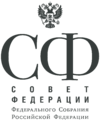Government role in the Russian Parliament From Wikipedia, the free encyclopedia
The Chairman of the Federation Council of the Federal Assembly of the Russian Federation (Russian: Председатель Совета Федерации Федерального собрания Российской Федерации), also informally called Speaker (спикер), is the presiding officer of the upper house of the Russian parliament. It is the third highest position, after the President and the Prime Minister, in the government of Russia. In the case of incapacity of the President and Prime Minister, the chairman of the Federation Council becomes Acting President of Russia.[1][2]
This article needs additional citations for verification. (May 2019) |
| Chairman of the Federation Council of the Federal Assembly of the Russian Federation Председатель Совета Федерации Федерального Собрания Российской Федерации | |
|---|---|
 Emblem of the Federation Council | |
| Appointer | Federation Council |
| Term length | No term limit |
| Formation | 13 January 1994 |
| First holder | Vladimir Shumeyko |
| Website | Federation Council |
The Chairman is elected from among the senators. That is the position held by one of the members of the Federation Council. The election is conducted by secret ballot using the ballot. The Federation Council may decide to hold a secret ballot using the electronic system.
Candidates for the post of Chairman of the Federation Council senators offered. Each member of the Council of the Federation has the right to propose only one candidate. For all candidates who have consented to stand, held a discussion during which they act at the meeting and answer questions from senators. After discussion, the Chamber approves the list of candidates for voting.
A candidate is considered elected if he received a vote of more than half of the votes of the members of the Federation Council. If the post of Chairman of the Federation Council was made more than two candidates and none of them has received the required number of votes for election, a second round of voting on the two candidates who received the greatest number of votes.
Totally 178 votes:[3]
| Candidate | Federal subject | For | Not vote |
|---|---|---|---|
| √ Sergey Mironov | Saint Petersburg | 151 | 27 |
Totally 178 votes:[4]
| Candidate | Federal subject | For | Abstained | Not vote |
|---|---|---|---|---|
| √ Sergey Mironov | Saint Petersburg | 159 | 2 | 17 |
Totally 172 votes:[5]
| Candidate | Federal subject | For | Abstained | Not vote |
|---|---|---|---|---|
| √ Sergey Mironov | Saint Petersburg | 156 | 1 | 15 |
Totally 166 votes:[6]
| Candidate | Federal subject | For | Abstained | Not vote |
|---|---|---|---|---|
| √ Valentina Matviyenko | Saint Petersburg | 140 | 1 | 25 |
Totally 170 votes:[7]
| Candidate | Federal subject | For | Not vote |
|---|---|---|---|
| √ Valentina Matviyenko | Saint Petersburg | 141 | 29 |
The office of the Chairman of the Federation Council has no term limit. The Chairman remains in his post until the end of his senatorial term. Even if he is re-elected for a new Senatorial term, the chairmanship automatically ends. If the former chairman is re-elected as senator, he can be re-elected as Chairman of the Federation Council.
The Chairman of the Federation Council can be dismissed by a decision of the Council of Federation receiving the majority of votes of the members of the Federation Council. The question of removal from office is considered by the Federation Council on admission of personal statements of the chairman or at the suggestion of a group of members of the Federation Council of no less than one fifth of the members of the Federation Council.

Chairman of the Federation Council:
Seamless Wikipedia browsing. On steroids.